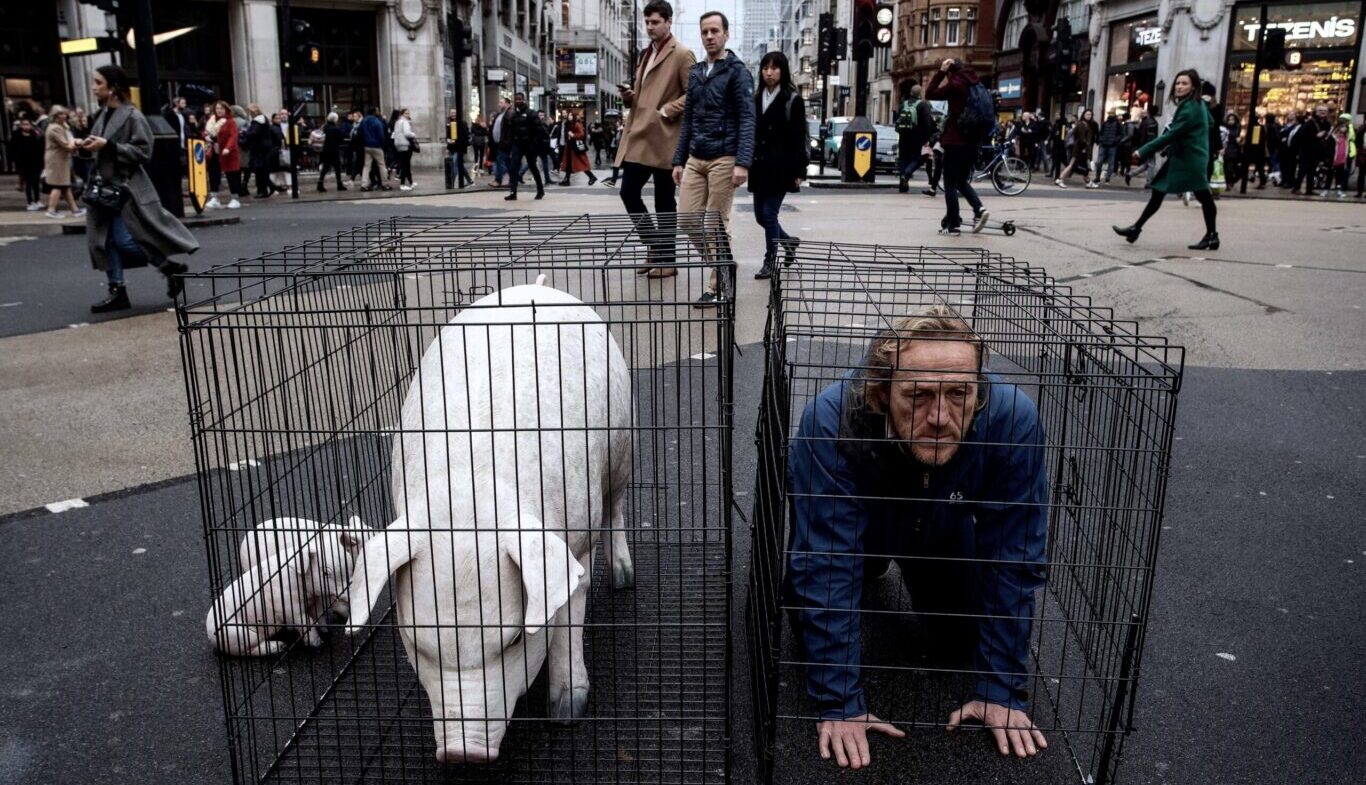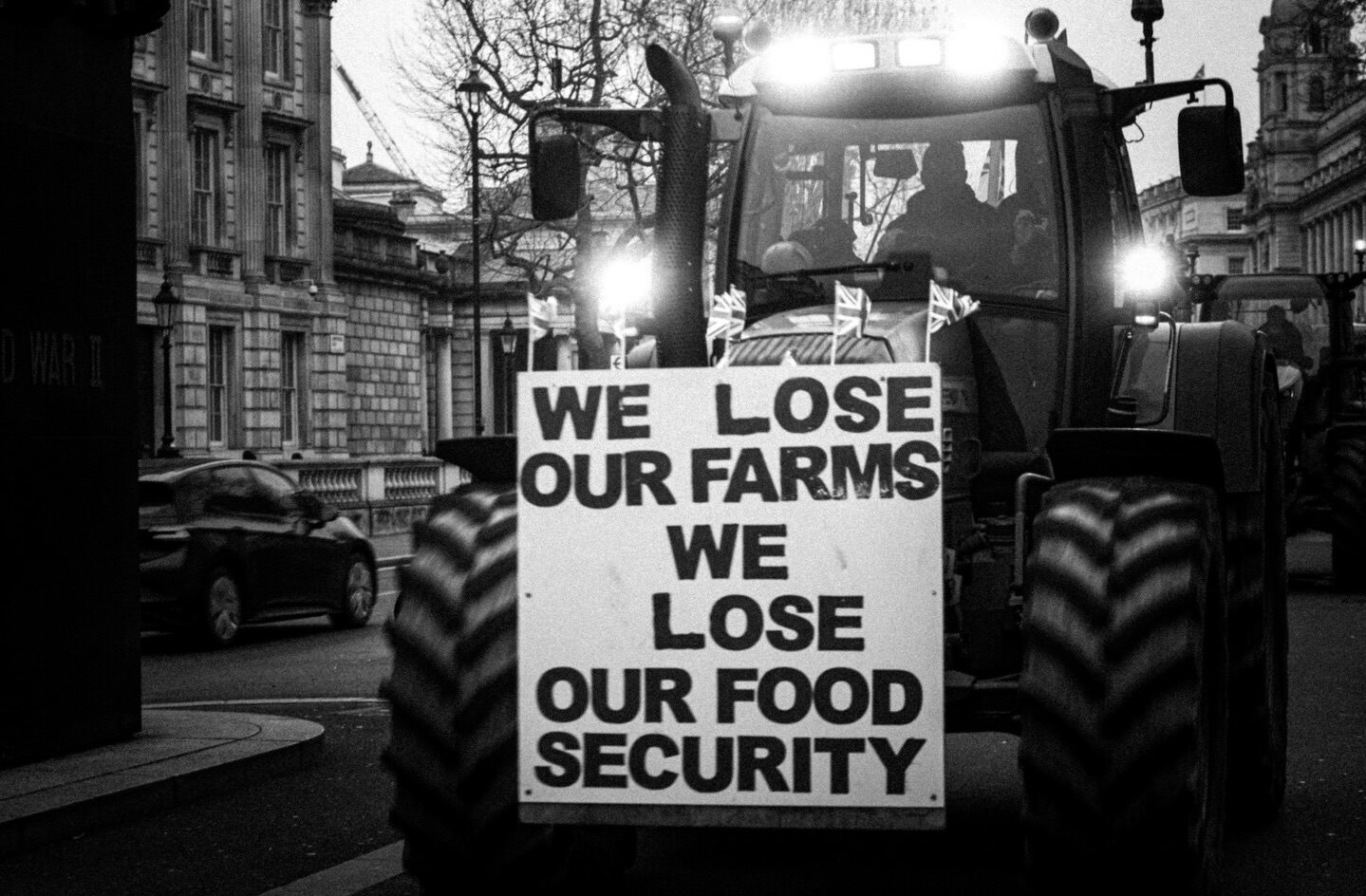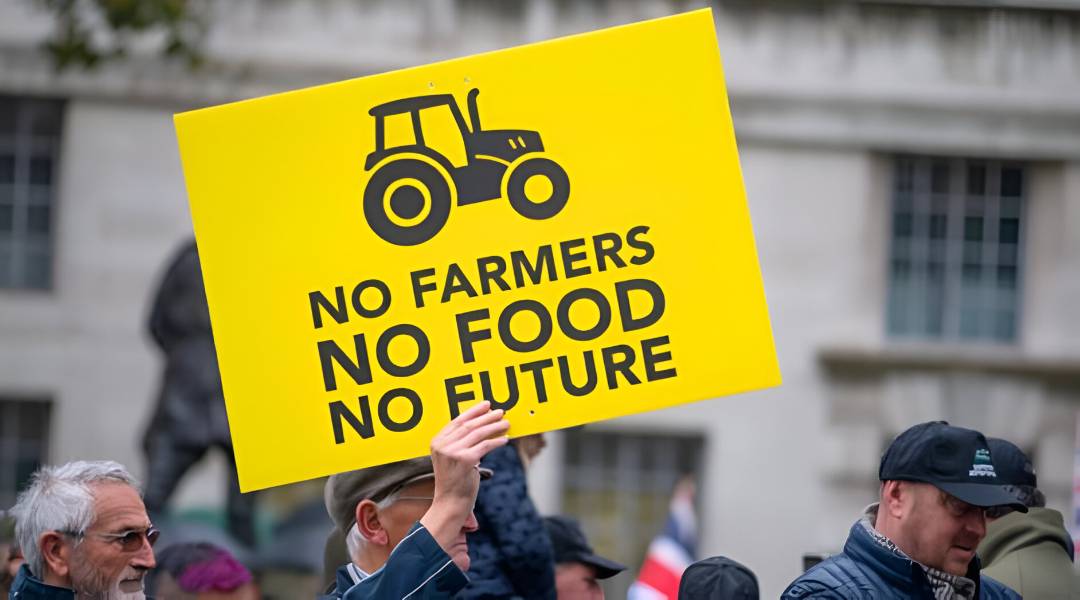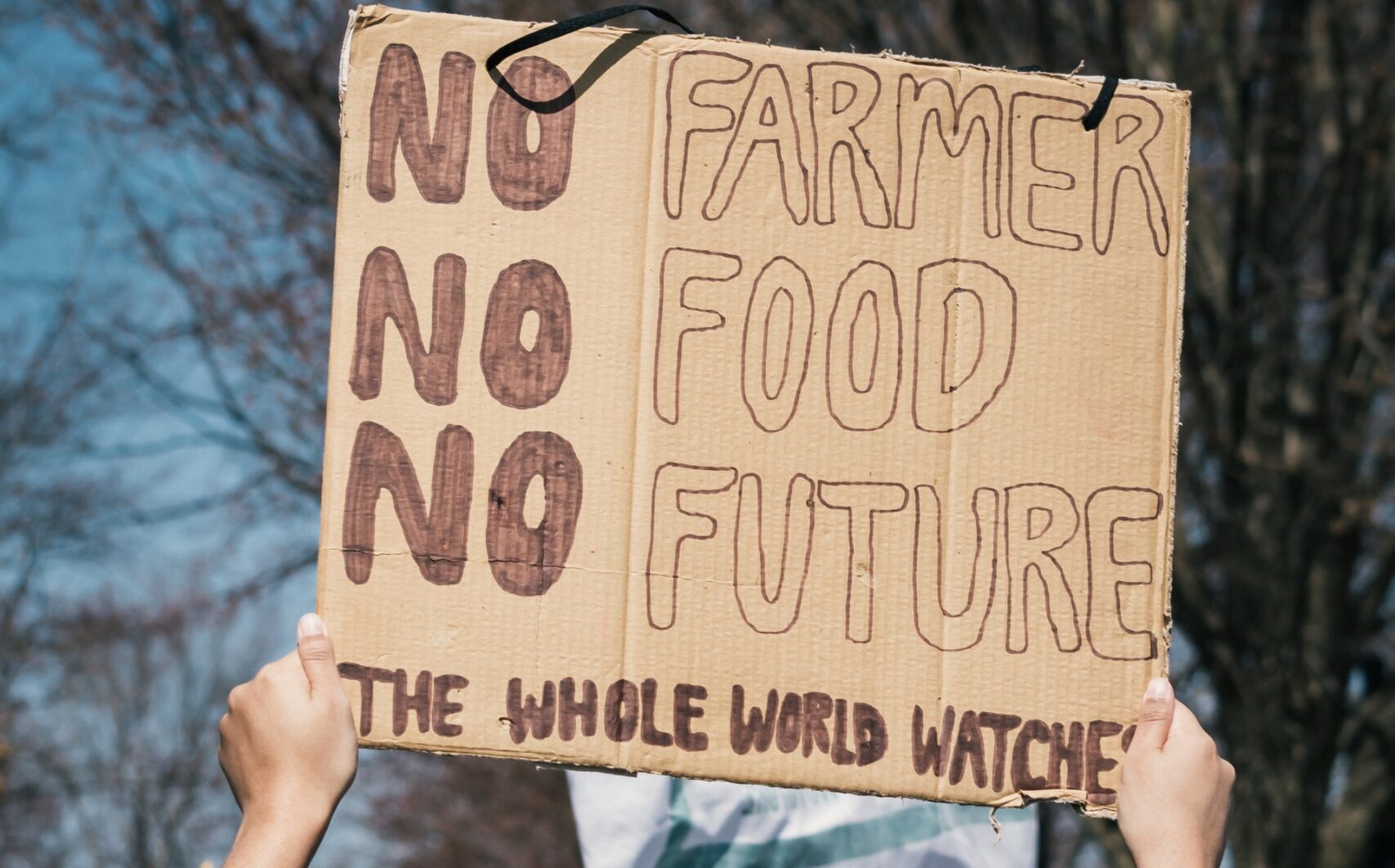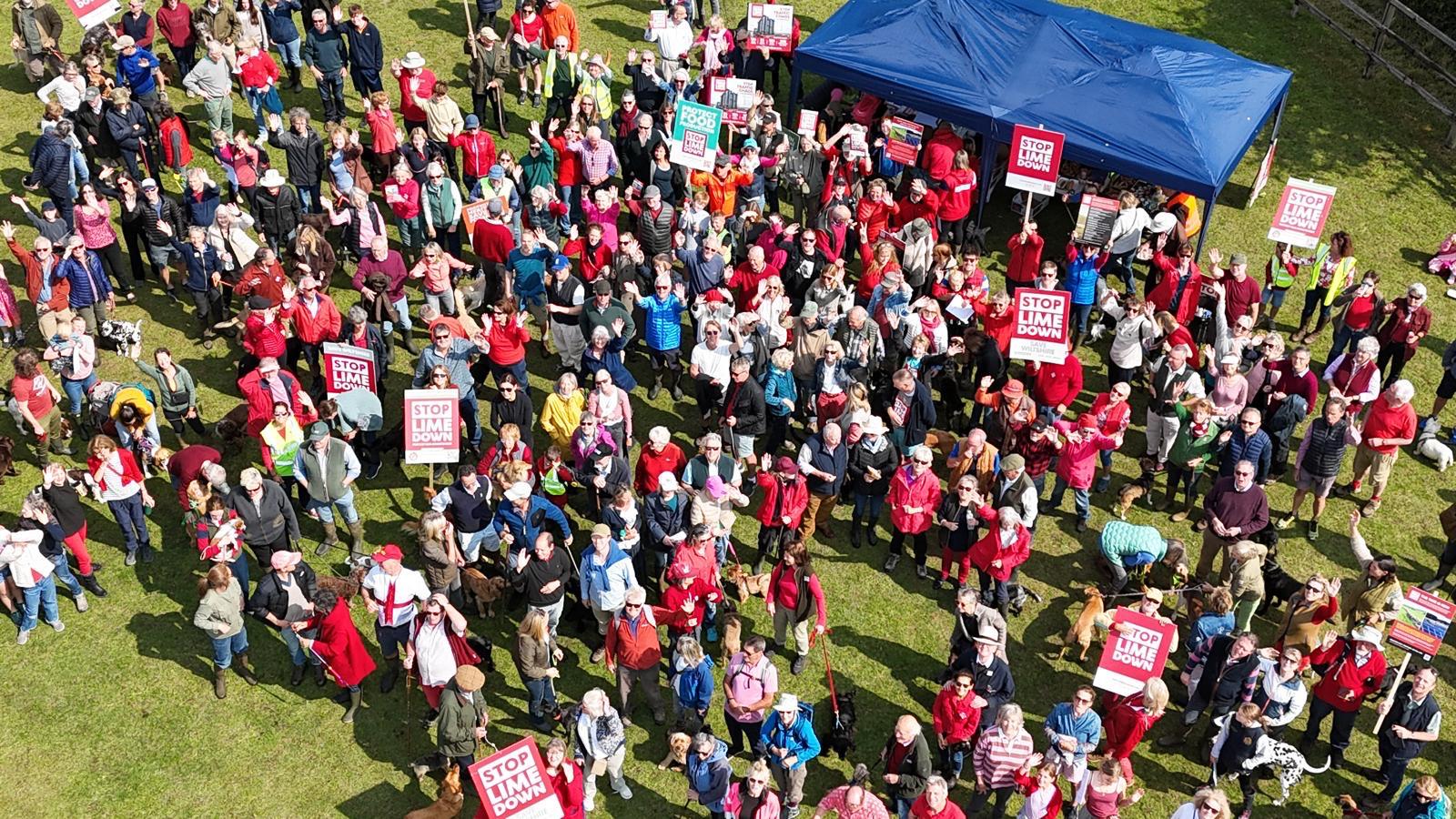? #RootingForRealFarms, Moch Cymreig Fedwen
Moch Fedwen Farm keep a herd of free range pigs in the Conwy valley, North Wales. The pedigree pigs have full traceability and produce nutritious, delicious pork. They’ve found that due to the pandemic, more people are looking to support local businesses with low food miles and more natural living conditions for animals. Rhys from the farm says, “We can’t compete with supermarkets in terms of price, but we do produce a superior product and people are more willing to pay a bit more for higher welfare… We’re trying to create food that we’re happy to eat and that we’re happy to feed our children.” If we don’t continue to support our local farmers & high welfare independent retailers now and into the future, we will lose them!
⛓️ Farrowing crate bill presented to parliament
Good news – the proposed Pig Husbandry (Farrowing) Bill, hopes to end the torture suffered by mother pigs that are confined for 5 weeks in narrow steel cages, too narrow for them to even turn around, while giving birth and suckling their piglets. The use of farrowing crates has already been banned in Norway, Sweden and Switzerland and will be banned in Germany from 2027. The Bill goes to the 2nd stage after a successful first reading on Wednesday. Watch Sir David Amess MP introduce the bill to parliament;
‘The Prime Minister himself stated in this chamber, and I quote, “there will be measures we will be able to implement as a result of Brexit, such as banning sow farrowing crates’. We must not waste this opportunity to become world leaders in animal welfare….I hope that the Government will support this Bill to ensure it becomes law and fully recognises the unnecessary pain and suffering sows experience in farrowing crates.’
Over thirty years ago in January 1991 the House of Commons debated another Pig Husbandry Bill that led to the UK banning sow stalls – also called gestation crates – narrow steel cages which inhumanely confined sows for their entire 16-week pregnancy. This cruel system is still allowed in the EU for 30 days in each pregnancy and in the US for their entire pregnancy. Though MPs in 1991 also called for a ban on the use of farrowing crates that confine mother pigs while giving birth and feeding her piglets, it has taken 30 years to get to a point where, with enough pressure from us and perhaps from Boris and his animal loving fiancee, will end some of the cruelty we inflict on these sentient beings. Please send a letter to your MP asking for their support.
However, to reflect a kinder system of production, the price of pork will increase just as we open our markets to countries whose standards of production are much lower than the UK’s, so cheaper. When the gestation crate (during pregnancy) was banned in the UK while it was still legal in the EU, the UK lost 40% of the sow herd. The cruelty was simply exported to the EU as supermarkets imported their cheaper pork. So, when you write to your MP asking them to vote for the bill, please emphasise that small and medium scale farmers must be subsidised both to help them change their infrastructure to more environmentally sensitive farming practices and to reduce the number of pigs on their farm. All of this could be achieved by reintroducing a meat marketing board that guarantees that farmers are paid the true cost of their production. These are the same price guarantees that thousands of protesting Indian farmers demand to be retained in India and which we had in the UK until they were abolished by the neo liberal government in the 1980’s.
? New laws bankrupt family farmers
Similarly, now that the Welsh government has voted to declare the whole of Wales a Nitrogen Vulnerable Zone and thereby protect the Welsh rivers from excess nitrogen from animal factories’ slurry, family farmers are up in arms as they can’t afford to upgrade their storage facilities to meet the new targets while environmentalists are delighted at the prospect of cleaner waters.
‘Following the vote, Welsh farming unions rounded on the Labour-led Welsh government, accusing it of orchestrating a “final betrayal” which would “kill off” family dairy farms and boost industrial-scale production.
‘The Welsh government insists that the new rules, which will mean tougher restrictions on the use of slurry and fertilisers, are necessary to tackle river pollution and improve water quality in rivers and lakes. They have been branded “draconian” by farming unions but welcomed by wildlife groups.
Our poor family farmers never win. The government claims it is going to reward farmers to green up their act through the Environmental Land Management Scheme (ELMS), a subsidy system whereby farmers receive ‘public money for public goods’. However, at the same time they are removing the subsidies for those who have already gone green! The Rural Payments Agency (RPA) officials decided to close down the Organic Higher-Level Stewardship (OHLS) scheme in 2019, blaming high administration costs for too few farmers. Adrian Steele, English Organic Forum co-chairman, described the plight of some individuals as heart-rending.
“Farmers affected are being forced to sell land, give up tenancies, retire or revert to conventional production. What has happened is a scandal. The decision was flawed and discriminatory, and, on top of that, there was no clear communication.”
? Corporate lobby blocks progress to end animal transport
Family farmers get the blame for animal cruelty and pollution from intensifying their production methods to compete with the giant corporate owned and run animal factories, and are then bankrupted by legislation that bans the worst parts of it. In reality, the problem is economies of scale that generate massive corporate profits that fund extraordinarily influential and unscrupulous lobby groups like the National Pig Association (NPA) that facilitate and promote a polluting and inhumane industry. (Of course true to form, the NPA opposed the ban on the gestation crate 30 years ago!) The NPA’s most recent affront against animals has been to call on Defra to reject proposals intended to improve animal welfare in transport that it said appear to have been driven by ‘perceived wisdom, rather than science’. I don’t really think that these humans deserve to be included in the classification of sentient being if collectively they can object to these underwhelming improvements;
‘If implemented, the proposals would ban live animal exports for slaughter, introduce new limits on journey times for pigs of 18 hours, with 48-hours rest between journeys and prevent journeys where external temperatures were below 5°C or above 30°C. They would set restrictive new requirements for space and headroom and ban journeys by sea if the wind was more than a strong breeze’.
?? Barbaric US Factory Farming
Life for family farmers and their animals will be a great deal worse when we open our borders to global trade. The Conservative majority voted against amendments to the Agriculture and Trade Bills that would have protected, in law, our food, farms and animal welfare standards from cheap substandard imports. So we now have to lobby for this protection in the negotiations of every trade bill, not least the UK/US trade bill. In my film Pig Business, Bobby Kennedy Jr. explains how barbaric animal factories dominate the market in the USA, ‘factory pig farming in the US can’t produce a pig cheaper than a family farmer without breaking the law’. The giant animal factories consider fines for breaking the law just an inevitable cost of business.
This recent report exposes all that is hidden behind razor sharp wire barriers behind which 80% of all antibiotics used in the US are used as growth promoters (banned in the EU and UK) or to keep animals alive in the unhealthy, overcrowded animal factories. This compares to the UK where 50% of all antibiotics are used to prevent and treat diseases in intensive animal factories.
DNA sequencing of bacteria found in pigs and humans in rural eastern North Carolina, an area with concentrated industrial-scale pig-farming, suggests that multidrug-resistant Staphylococcus aureus (MRSA) strains are spreading between pigs, farmworkers, their families and community residents, and represents an emerging public health threat, according to a study led by researchers at the Johns Hopkins Bloomberg School of Public Health.
In this fascinating webinar, US environmental activists describe the true impact of US pig Factories:
‘On top of waste pollutants contaminating surface water, groundwater, air, and soil, all of which have detrimental effects on communities’ health and quality of life, you have to add that, in order to convert methane into energy, the greenhouse gas must be transported from CAFOs (concentrated animal feeding operation) to a facility that can process it. This requires low-pressure transmission lines that will run beneath nearby communities with limited regulation around these lines puts residents at risk should an accident occur.’
? US Trade deal kicked into the long grass
On the US/UK trade deal front there’s good news; due to the huge efforts of Global Justice Now and other campaign groups demanding vital amendments to the Bill, it’s process through parliament was sufficiently delayed to see Trump replaced by President Biden who has put the deal on hold. Jean Blaylock, their Campaign and Policy Manager, writes,
‘After the first round of negotiations, leaks emerged that the UK negotiators were offering to sacrifice key food standards in order to secure a quick deal – despite manifesto promises. The public outcry was immense, and many of you were part of that, contacting MPs and speaking out. Within days ministers were forced to back down. And from that point on the campaign ballooned and we didn’t let up.
‘We made sure that the things people value – the NHS, high standards, workers rights’, digital rights – were front and centre whenever the US deal was talked about. That made it impossible for a deal to be rushed through before the US election.
‘We’re not complacent now that Biden is president. The drivers of the US trade deal are corporate – big pharma, big agriculture, big tech – and that doesn’t change much whoever is the president. However in the short term Biden has said that he won’t sign new trade deals until he has focused on domestic issues’.
☣️ Toxic time of year
While enjoying the sights and sounds of spring in April, you may encounter a horrendous smell of chemicals as your council sprays the toxic weed killer Round-up on your parks, playgrounds and pavements. This is despite the fact that the producer, Monsanto, now owned by Bayer Chemicals, is being sued for billions of dollars in class actions by thousands of Americans poisoned by the toxic chemical glyphosate, along with other toxic additives in Round-up. With the climate emergency, collapsing biodiversity and a global health crisis underway, it is imperative that our urban spaces become healthier places for people and wildlife. The body of evidence linking pesticides to serious human health and environmental harms is growing, as is the movement to end their use. So, before the councils get their sprayers out, see page 13 of this Pesticide Action Network report and ask your town council to follow the example of 36 UK councils, to stop or significantly reduce their use of herbicides.
? Hero takes on big ag
While there is clear evidence that agricultural intensification in the UK is causing severe environmental pollution across the countryside, deforestation in Brazil, and poses a risk to public health by increasing the chances that diseases like avian flu will jump from animals to humans, councils continue to approve the building of new corporate owned animal factories. Corporate power is far stronger than the millions of people who want these polluting, inhumane and antibiotic-dependent animal factories to be banned. My inspiration to continue campaigning against all odds of winning the war, comes from the myriad of brilliant campaigners, activists and heroes working to end this corporate takeover. One such hero is Jane Tredgett, the founder of non-profit Humane Being through which she and fellow volunteer campaigners launched the Scrap Factory Farming campaign. Their aim is to ‘crowdfund a legal challenge against the UK Government to force it to end factory farming – in other words, all farming that involves the intensive confinement of animals’.
“Now everything seems to be aligned, with increasing awareness about the climate crisis, increasing awareness about the Amazon destruction and the part that animal agriculture plays in that.” She believes that even if their case goes to court and they lose, it will be “a catalyst for change. And I don’t think there’s anything to lose and everything to win.”
Renowned human rights barrister Michael Mansfield QC is leading their legal team in the challenge on the Government.
? Polluted rivers from too much effluent
One of Jane’s biggest concerns is that there has been a 26% increase in large intensive pig and poultry factories in the UK since 2011. In the Welsh region of Powys alone, more than 150 intensive poultry units have been approved by the council in the past five years, earning the county a reputation as the chicken farm capital of Wales. The resulting pollution of the River Wye was one of the environmental disasters that led to a success in the Judicial Review process where the court overturned the local council’s approval for yet another factory poultry factory in the Wye Valley last January.
However, now the Judicial Review legal process itself is under threat. After the Government launched an ‘independent panel to look at judicial review’ last summer, law experts have warned that public access to legal challenges may be reduced, with the process made more ‘pro-government’.
? No neighbourhood is safe
The Tory government is set against locals using the law to end animal factories because they want a high-tech agri-industrial system that rewards corporate owned and controlled agriculture at the expense of decentralised family farms. And councils are too poor to fight the wealthy animal factory developers. Residents in County Antrim, N. Ireland were devastated when planning applications to hugely expand pig numbers in the county were swept through without regard for the inevitable nitrate pollution, toxic stench and animal cruelty inherent in the animal factory system. When filming ‘Pig Business in N. Ireland‘ in 2018, I heard from numerous people living next to existing intensive pig factories that the stench was intolerable, causing a plague of flies and preventing them from using their gardens or hanging washing up to dry. Yet a local councillor, who also happens to be an intensive farmer himself, said, ‘there is no smell, no run-off’…’. It is not simply the pungent smell of ammonia which is of concern, ammonia pollution has been linked to lung damage, heart disease, diabetes, problems with memory, cognitive decline, respiratory issues, higher death rates and lower birth rates.
? Agroecology or gene editing?
Planning permission for the expansion of the factory at Calhame Road Ballyclare was granted although the proposed factory would produce more than twice the amount of slurry than is permitted by the existing permit. The response from DAERA (Northern Ireland’s Department of Agriculture Environment and Rural Affairs) was to commission research into the ammonia problem by Agri Food Biosciences Institute (AFBI). One of the Institute’s recommendations was to use scrubbers to reduce ammonia, although Friends of the Earth say they are typically only 40% effective. The Institute is due to announce 5 further measures to reduce ammonia pollution, including ‘genetic improvement’. Despite the growing cautionary literature on unintended consequences of genetic manipulations, massive government R&D subsidies have been poured into its current project of targeted genome editing to enhance genetic resistance to Mycobacterium bovis infection in domestic cattle populations. Intensive lobbying by corporate lobbyists have convinced governments to pour subsidies into gene editing (not permitted in the EU) as a solution to the intractable problem of excess ammonia produced by animal factories. Natural methods like agroecology get no R&D funding because they work for farmers, people and nature and not for corporations demanding a massive profit to wield excessive power and control over or food supply.
? Human rights overshadowed by big business in UN food summit
Corporate interests have even taken over the UN Global Food Summit due to be held in the last months of 2021 with the aim to develop a more sustainable food system that can eliminate hunger and malnutrition. This report raises concerns that, ‘it’s mostly market-based approaches that are being championed in the summit, while critics say these are at the core of many of the problems with global food systems, including inequality, low salaries, bad working conditions, disregard for land rights and other socio-economic and cultural rights. Other alternatives such as agroecology and indigenous-based practices have also been left out’.
Contents
Share This Article
Related ArticlesView All
Protect UK Farmers from Low Standard Imports
The purpose of our newsletter is to give you important information that is censored in the mainstream media. “The way… Read More
Protectionism vs So-Called Free Trade
The purpose of our newsletter is to give you important information that is censored in the mainstream media. “The way… Read More
Find A Farmer
The purpose of our newsletter is to give you important information that is censored in the mainstream media. “The way… Read More
Zionist Money Rules
The purpose of our newsletter is to give you important information that is censored in the mainstream media. “The way… Read More
The Price of Progress
The purpose of my newsletter is to give you important information that is censored in the mainstream media. “The way… Read More
Silencing Dissent Through Fear
The purpose of my newsletter is to give you important information that is censored in the mainstream media. If you… Read More
